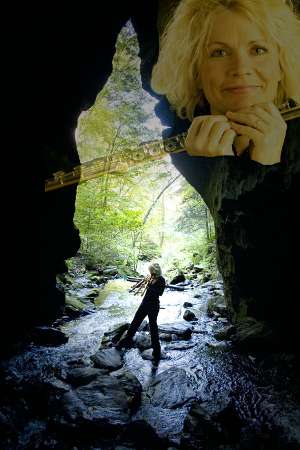Interview with Rhonda Larson–Grammy Award winner flutist

It looks like Rhonda Larson was born wanting to play the flute. At the age of 10, Rhonda began the musical journey. She practiced on a high mountain ridge outside of her family home in Bozeman, Montana. It is clear how she got the deep natural-impact on her music.
Been the one who follows her own path, Rhonda declined the invitation to attend Juilliard. Instead, she chose to remain in the inspirational natural surroundings of the west and study at the University of Idaho in Moscow, Idaho. In her final year, she won the prestigious National Flute Association’s Young Artist Competition, including a Carnegie Hall debut. Not only was she the youngest winner in the history of the competition, but a student from Juilliard was awarded the second prize.
In her final month of university, Rhonda was discovered by Paul Winter who invited her to join the Paul Winter Consort. She immediately began a non-stop touring career and made numerous highly acclaimed recordings with this innovative group. After eight years with the Consort and a newly-won Grammy Award, Rhonda realized it was time to move on to explore new musical vistas of her own.
Rhonda immersed herself in the diverse musical influences the Consort experiences afforded her, and began experimenting with her growing collection of ethnic flutes. Composing her own music and forming her own band, “Ventus”, Rhonda continued performing and teaching masterclasses around the world. She was invited to perform on the CBS television finale episode of “Survivor”, live from New York City’s Madison Square Gardens, as seen by over 40 million viewers.
 We had an email interview with Rhonda.
We had an email interview with Rhonda.
Q1. Tell us something about your early days. How you liked music and thought of picking it up as a career?
I always say I was “born” wanting to play the flute. I don’t understand it, nor can I explain it other than this. On the very day I was tested on flute, at age 10, to see whether I could play one or not, I was so afraid I would not be able to make a sound, as I knew my life would be “over” if I could not do it! Fortunately, I made a sound instantly! My life could, and did, begin.
Q2. Talking about flute, how it attracted you? Was there anything particular about this instrument?
I am not sure what I loved so much about the flute, other than the obvious apparitions: the sound, and how graceful I thought it looked to hold it. I also liked that it was “sparkling”, being silver.
Q3. Tell us about your training and how you liked those days. How was the experience to devote so much time to music?
I have always taken refuge in the devotion that music requires in learning your instrument. It has suited my personality perfectly, a solitary act with the intensity of prayer or meditation, meaning it requires absolute awareness and astute attention in ‘learning’. I loved all events that were about music and the training involved. I also had a GREAT flute teacher early on, who was able to respond perfectly to my hunger and love to learn the flute and the music world in general.
Q4. Till now, you have ventured into lots of capacities as a musician—recording, workshops, ambassador, etc. Which one of these you like most?
Great question: they are all tied together, I don’t think I can separate them. But perhaps at the end of the day, when the training is over for that day, I love the ambassador aspect, bringing music to other cultures and peoples, as this speaks beyond languages. This is also true in a different way with my own American culture: simply defining to audiences what it is to be a performing artist, and the life this permits (fulfillment/freedom) and requires (discipline physically and mentally, and one-pointed focus for hours at a time).
Q5. How much do you like the element of experimentation within the range of a particular instrument? Does it help you to evolve as a musician?
I believe that everything we do in our music training IS in continuous evolution. In fact, if this is not happening, I think one must question themselves as to what they are really doing. There is no point just staying the same from day to day, practicing to “maintain” what you already ‘have’. No, I think it is practicing to push the boundaries of my own tent stakes, on a daily basis. Be more than you, at this very moment, ARE. This is my training, every day.
 Q6. Collaborating with different artists often opens new vistas for a musician. Tell us which artists you have performed and their musical background?
Q6. Collaborating with different artists often opens new vistas for a musician. Tell us which artists you have performed and their musical background?
The goal really is to collaborate with as many accomplished artists as possible. I say accomplished, as I have collaborated with plenty of the opposite, to an un-rewarding end… But being able to collaborate with those who love what they do and are great at it stretches my own canvas much larger by the challenge present to ‘step up’. I have been able to perform with some of the greatest musicians of our day: members and extended members of the Paul Winter Consort, a Spanish group called Milladoiro, great piano players like Tim Ray, and great teachers that ultimately led me to all of these serendipitous collaborations. I have extremely high standards, and I look for musicians cut from this same cloth.
Q7. How was the feeling when you won Grammy?
I won a Grammy as a member of the Paul Winter Consort in 1994. We had never been nominated before this time, and so several of us attended the ceremony/broadcast in New York City’s Radio City Music Hall. For some reason unrecalled by my own memory, it was agreed that I would be the one to give the “acceptance” speech, should we win. Perhaps that came about because NONE of us thought we would win! Joke on my colleagues, we did win that night, and I indeed gave the effusive speech! One of the finest moments of my life, really, because it was such a surprise! Suddenly there we were, on the stage receiving the statue/honor, with the television monitor flashing over and over, “One Minute, One Minute” (trying to guide the winners’ acceptance speech, that is). As life would have it, my boyfriend at the time broke up with me later that night, so it is the life of intense highs and lows, all at the same time….the life of a musician, to be sure. I still honor the act of dusting off that Grammy statue in my home, with nothing but a big smile, with perpetual hopes to come!
Q8. What do you feel is the true satisfaction point for an artist—winning awards or winning hearts? What personal satisfaction do you seek in your music?
Another great question! Hands down, WINNING HEARTS!!! Competitions are only artificial events that help one to know where they may rate among other like-players. But to win hearts? This is the gift of what can only be called the universes’ Benevolent Force. I LIVE to win hearts, nothing else really matters in my walk as a musician. It is what I am a Musician, with the capital M, for!
 Q9. While talking to youngsters and aspirants in your workshops, what essential elements you stress upon to learn flute?
Q9. While talking to youngsters and aspirants in your workshops, what essential elements you stress upon to learn flute?
A love of what they are doing! If you do not love music, or the flute, or have far too much stress in the act of playing, this is the very element that needs attention and deserves severe self-scrutiny. I see it too much—people who are playing because perhaps their parents pushed them this way, or they don’t know what else to pursue, but I feel and hear no LOVE in their playing or actions as a musician. As the great book from Rilke says, in “Letters to a Young Poet” (with my own arrangement of his words/point): “Play only because you MUST play—that you cannot imagine doing anything else in your life, you might die otherwise….then play”. Of course, his message was the word ‘write”, rather than “play”.
Q10. Do you like to play various other types of flutes from different countries?
Perhaps you have not heard my performances? I am absolutely ensconced in playing other flutes from around the world! Flute is only second to percussion in being the oldest instrument in the history of musical instruments. Because of this fact, every culture has their own version of flute. These are completely refreshing and soulful flutes unique to their culture, and offering their OWN music they seem to beg for. (at least for me, when I play these varied instruments).
Q11. Tell us what else you like to do while not playing music.
I am obsessed with Nature. I need to be in nature every day….walking, running, biking, cross-country-skiing, you name it—-IN NATURE. The woods, the forests. I need raw nature. I need to immerse myself in the very environment that “man” has nothing to do with—in fact, it is the only place that “man” has not created. I completely love and need this environment. I am a nature person. In fact, my music publishing company I named “Wood Nymph Music”. This is me. I am amazed to discover in my travels around the world how many people no longer spend ANY time out in nature….this is the beginning of the collapse of our true culture.
Q12. Do you feel music has helped you to evolve as a different person altogether than you otherwise would have been?
Were it not for music, I am quite sure I would be dead by now! Music is my motivation, energy, and positive outlook in life, and I am permitted to see daily feedback of the good result of that very path. But first of all, it is for me….my path that teaches me “how” to live. Second, then I work it to the degree to “give it away” as performance allows, to feed the masses, as they say….
Q13. What message you would like to give to the readers and young aspirants of music?
Love what you do, and know that no matter how young or old you are in choosing music as your path, you are in TRAINING—use it as your PROGRAM to pay attention, be alert, and listen to that Benevolent Force speaking directly to you while you do so….Music is truly for the betterment of humankind, beginning with the individual musician training for such!

 Album Review—Inner Sanctum
Album Review—Inner Sanctum  Album review—Back To My Roots
Album review—Back To My Roots  Album Review—Days of Gypsy Nights
Album Review—Days of Gypsy Nights  Album Review—Open by Stephen Wallack
Album Review—Open by Stephen Wallack